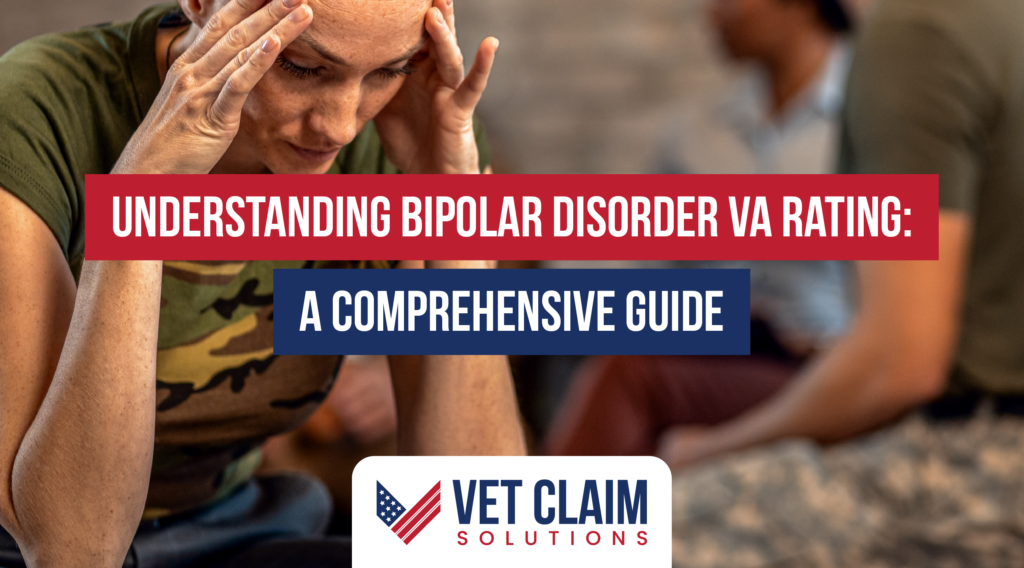The Department of Veterans Affairs (VA) recognizes bipolar disorder as a serious health condition that can significantly impact a veteran’s life. You’ll learn how the VA rates bipolar disorder, the criteria for service connection, and resources for veterans seeking support. Understanding the VA’s rating system for a Bipolar Disorder VA Rating is essential for veterans to receive appropriate disability benefits.
The journey through the VA system can feel overwhelming, especially when dealing with an often-misunderstood mental health condition such as Bipolar Disorder. However, remember, you’re not alone in this journey. We’re here to simplify things and empower you to navigate the system confidently.
Understanding Bipolar Disorder and its Impact on Veterans
Bipolar disorder is a mental health condition characterized by intense mood swings that fluctuate between periods of elevated mood (mania or hypomania) and low mood (depression). It’s much more than just feeling “up” or “down” – these mood swings are extreme, long-lasting, and can interfere with a person’s daily life.

These intense mood swings impact relationships, work, and overall well-being. Imagine a roller coaster ride with exhilarating highs and gut-wrenching lows. That’s the experience many veterans face with Bipolar Disorder, as they grapple with extreme shifts in energy, motivation, sleep patterns, and the ability to think clearly.
Types of Bipolar Disorder:
The three main types of bipolar disorder are bipolar I, bipolar II, and cyclothymic disorder. They’re diagnosed based on the specific pattern and intensity of these mood episodes:

Bipolar I disorder involves experiencing at least one manic episode, which can be so severe that hospitalization might be necessary.

Bipolar II disorder is characterized by at least one hypomanic episode (a milder form of mania) and at least one major depressive episode.

Cyclothymic disorder presents with periods of hypomania and milder depressive symptoms for at least two years.
While the exact causes of bipolar disorder are still being studied, research points toward a combination of genetic predisposition (family history of the illness), brain chemistry imbalances, and environmental triggers. These triggers can be traumatic experiences or extremely stressful situations. For veterans, experiences during service such as exposure to combat, witnessing traumatic events, or sustaining head injuries like Traumatic Brain Injury (TBI) can contribute to developing bipolar disorder.
How Common Is Bipolar Disorder in Veterans?

While pinning down precise figures for mental health conditions within the veteran population can be complex, research reveals significant prevalence rates. A 2016 study revealed that over 1.1 million Veterans seeking care within the VA Patient Aligned Care Team (PACT) between 2010 and 2011 were diagnosed with at least one of five major mental health conditions.
This included bipolar disorder, highlighting its impact within this population. A formal diagnosis from a qualified healthcare professional is required to receive a VA disability rating.
Service Connection for Bipolar Disorder:
For many veterans dealing with this challenging condition, the idea of receiving support through VA disability benefits is a beacon of hope. To be eligible for these benefits, you have to show that your bipolar disorder is service-connected.
Three Crucial Steps:

1. Current Bipolar Disorder Diagnosis: This requires a formal diagnosis by a qualified healthcare professional (such as a psychiatrist or psychologist) using the criteria outlined in the Diagnostic and Statistical Manual of Mental Disorders, Fifth Edition (DSM-5).

2. Connecting the Dots to Your Service: You’ll need to demonstrate a connection between your current bipolar disorder diagnosis and an incident, injury, or illness that occurred during your time in service. This connection can include exposure to traumatic events, physical injuries like TBI, or periods of extreme stress directly related to your military duties. It’s essential to understand that even if symptoms didn’t appear immediately, experiences from your time in service might have triggered them later.

3. Nexus: VA will then evaluate the evidence and, if a clear link is not evident from your records, they will schedule you for a compensation and pension (C&P) exam by a qualified medical professional to determine if a link is present. Often this evaluation will include gathering supporting documentation like service records, medical records, and potentially even personal statements from you or those who knew you during your time in service. The VA uses a diagnostic code to properly evaluate and rate your condition.
VA Rating System: How Bipolar Disorder Is Evaluated

The VA utilizes a rating system ranging from 0% to 100% to determine the severity of a veteran’s bipolar disorder. Your Bipolar Disorder VA Rating will dictate the amount of disability compensation you’ll receive monthly. It’s determined based on how much your condition affects your ability to function in your day-to-day life – both at work or a similar setting, and in social situations. Think of “occupational” as how your Bipolar Disorder VA Rating affects your capacity to maintain steady employment.
While the VA acknowledges bipolar as a disability under section § 4.130, this journey to access these benefits can seem overwhelming. Don’t be afraid to seek out experienced professionals who can assist you with your claim. They will also be able to help you understand how the VA rates disability and other benefits you may be entitled to.
Here’s a simplified breakdown of the rating levels and their corresponding criteria as outlined in the General Rating Formula for Mental Disorders. Remember: this is a simplified overview, and the exact criteria used by the VA are much more nuanced.
VA Bipolar Disorder Rating Criteria:
| Rating | Description | Occupational & Social Impact |
|---|---|---|
| 100% | Total occupational and social impairment. | Symptoms like persistent delusions, severe memory loss, inability to maintain personal hygiene, being a danger to self or others, disorientation, difficulty with basic tasks, etc. |
| 70% | Significant occupational and social impairment. | Suicidal thoughts, obsessive rituals, panic attacks, severe depression, difficulty managing stress, impulse control problems, etc. |
| 50% | Occupational and social impairment that affects work and relationships. | Panic attacks more than once per week, difficulty understanding complex commands, impaired memory, mood swings affecting relationships and employment. |
| 30% | Occupational and social impairment with periods of normal functioning. | Occasional decrease in work efficiency, depression, anxiety, panic attacks, difficulty sleeping. |
| 10% | Occupational and social impairment mainly during times of high stress. | Symptoms are generally controlled by medication, only becoming problematic during highly stressful periods. |
| 0% | Minimal or no symptoms, diagnosis confirmed. | While diagnosed with the condition, it does not significantly impair daily functioning. No regular treatment or medication is required. |
Each level represents the severity and frequency of your bipolar symptoms and how they interfere with your ability to hold a job and maintain healthy relationships. This is why it’s important to have an experienced VA disability attorney on your side. They will help you get the evidence you need to support your claim.
Seeking Support for Bipolar Disorder

It is critically important that you never downplay the impact your Bipolar Disorder is having on your daily life. Be honest about your struggles with mood swings, depression, anxiety, or other symptoms, including how those symptoms affect your daily life. Also, if you are struggling, know that there are people ready and willing to listen.
You can reach out to the Veterans Crisis Line. It’s free, confidential, and available 24/7 for veterans and their families.
FAQs about Bipolar Disorder VA Rating:
1. Can you get VA disability for bipolar?
Yes. However, receiving benefits isn’t automatic. The condition must be officially diagnosed and service-connected to qualify for a Bipolar Disorder VA Rating. It is important to work with healthcare professionals, gather strong evidence, and consider legal help from an experienced VA disability attorney.
2. Can you get a disability for being bipolar?
Yes, the VA recognizes bipolar disorder as a qualifying condition. Veterans must establish a service connection by providing documentation and undergoing evaluations. Make sure you keep detailed records of how your bipolar disorder symptoms impact your daily life.
Conclusion
Successfully securing VA disability for Bipolar Disorder can be a challenging process with a lot of complex steps. The VA is the single largest healthcare system in the US, and a massive administrative machine. It’s also important to remember that the VA employs hundreds of thousands of people, and the country owes you a debt of gratitude for your service.
Yet, remember that your well-being is a top priority. Don’t hesitate to advocate for yourself by compiling a thorough record of your medical history, military service, and the ways in which Bipolar Disorder has impacted your ability to function. Working with an experienced VA disability attorney can make a big difference in getting your claim approved.


